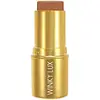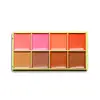What's inside
What's inside
 Key Ingredients
Key Ingredients

 Benefits
Benefits

 Concerns
Concerns

 Ingredients Side-by-side
Ingredients Side-by-side

Tridecyl Trimellitate
EmollientHydrogenated Polyisobutene
EmollientBis-Diglyceryl Polyacyladipate-2
EmollientMica
Cosmetic ColorantPentaerythrityl Tetraethylhexanoate
EmollientIsononyl Isononanoate
EmollientDiisostearyl Malate
EmollientOzokerite
Emulsion StabilisingCera Microcristallina
Emulsion StabilisingVinyl Dimethicone/Methicone Silsesquioxane Crosspolymer
Polyethylene
AbrasiveSilica
AbrasiveSilica Dimethyl Silylate
EmollientLimnanthes Alba Seed Oil
Skin ConditioningLecithin
EmollientTocopheryl Acetate
AntioxidantPhenoxyethanol
PreservativePhytosteryl/Octyldodecyl Lauroyl Glutamate
Skin ConditioningPolyhydroxystearic Acid
EmulsifyingAlumina
AbrasiveGlycerin
HumectantCI 77891
Cosmetic ColorantCI 77491
Cosmetic ColorantCI 77492
Cosmetic ColorantCI 77499
Cosmetic ColorantTridecyl Trimellitate, Hydrogenated Polyisobutene, Bis-Diglyceryl Polyacyladipate-2, Mica, Pentaerythrityl Tetraethylhexanoate, Isononyl Isononanoate, Diisostearyl Malate, Ozokerite, Cera Microcristallina, Vinyl Dimethicone/Methicone Silsesquioxane Crosspolymer, Polyethylene, Silica, Silica Dimethyl Silylate, Limnanthes Alba Seed Oil, Lecithin, Tocopheryl Acetate, Phenoxyethanol, Phytosteryl/Octyldodecyl Lauroyl Glutamate, Polyhydroxystearic Acid, Alumina, Glycerin, CI 77891, CI 77491, CI 77492, CI 77499
Polybutene
Hydrogenated Polydecene
EmollientDiisostearyl Malate
EmollientPentaerythrityl Tetraisostearate
EmollientPetrolatum
EmollientHydrogenated Polyisobutene
EmollientOzokerite
Emulsion StabilisingBis-Diglyceryl Polyacyladipate-2
EmollientMicrocrystalline Wax
Emulsion StabilisingButyrospermum Parkii Butter
Skin ConditioningBeeswax
Emulsion StabilisingTocopheryl Acetate
AntioxidantMica
Cosmetic ColorantCalcium Sodium Borosilicate
CI 77891
Cosmetic ColorantIron Oxides
CI 15850
Cosmetic ColorantCI 19140
Cosmetic ColorantCI 15985
Cosmetic ColorantCI 45380
Cosmetic ColorantCI 45410
Cosmetic ColorantPolybutene, Hydrogenated Polydecene, Diisostearyl Malate, Pentaerythrityl Tetraisostearate, Petrolatum, Hydrogenated Polyisobutene, Ozokerite, Bis-Diglyceryl Polyacyladipate-2, Microcrystalline Wax, Butyrospermum Parkii Butter, Beeswax, Tocopheryl Acetate, Mica, Calcium Sodium Borosilicate, CI 77891, Iron Oxides, CI 15850, CI 19140, CI 15985, CI 45380, CI 45410
Ingredients Explained
These ingredients are found in both products.
Ingredients higher up in an ingredient list are typically present in a larger amount.
This ingredient is lipid-based synthetic skin-conditioning agent derived from adipic acid and a mixture of fatty acids. It is often called a lanolin substitute.
As an emollient, it helps soften and hydrate the skin. Emollients create a barrier on the skin to trap moisture in.
Due to its fatty acid base, it may not be Malassezia folliculitis safe.
Learn more about Bis-Diglyceryl Polyacyladipate-2Ci 77891 is a white pigment from Titanium dioxide. It is naturally found in minerals such as rutile and ilmenite.
It's main function is to add a white color to cosmetics. It can also be mixed with other colors to create different shades.
Ci 77891 is commonly found in sunscreens due to its ability to block UV rays.
Learn more about CI 77891Diisostearyl Malate is an emollient and most often used in lip products. It comes from isostearyl alcohol, a fatty acid, and malic acid, an AHA.
As an emollient, Diisostearyl Malate helps create a thin film on your skin to trap moisture in. This helps keep your skin soft and smooth.
Hydrogenated Polyisobutene is a synthetic polymer. Polymers are compounds with high molecular weight. Hydrogenated Polyisobutene is an emollient and texture enhancer.
In one study, Hydrogenated Polyisobutene showed better skin hydration levels than Caprylic/Capric Triglyceride. As an emollient, it helps keep your skin soft and hydrated by trapping moisture in.
Hydrogenated Polyisobutene is often used as a mineral oil replacement.
Learn more about Hydrogenated PolyisobuteneMica is a naturally occurring mineral used to add shimmer and color in cosmetics. It can also help improve the texture of a product or give it an opaque, white/silver color.
Serecite is the name for very fine but ragged grains of mica.
This ingredient is often coated with metal oxides like titanium dioxide. Trace amounts of heavy metals may be found in mica, but these metals are not harmful in our personal products.
Mica has been used since prehistoric times throughout the world. Ancient Egyptian, Indian, Greek, Roman, Aztec, and Chinese civilizations have used mica.
Learn more about MicaOzokerite is a naturally occuring mineral wax. In cosmetics, ozokerite is used as a texture enhancer.
Ceresin wax is derived from this ingredient.
The melting point of ozokerite is 58-100 C.
Ozokerite is found all over the world including Scotland, the US, and India.
Learn more about OzokeriteTocopheryl Acetate is AKA Vitamin E. It is an antioxidant and protects your skin from free radicals. Free radicals damage the skin by breaking down collagen.
One study found using Tocopheryl Acetate with Vitamin C decreased the number of sunburned cells.
Tocopheryl Acetate is commonly found in both skincare and dietary supplements.
Learn more about Tocopheryl Acetate